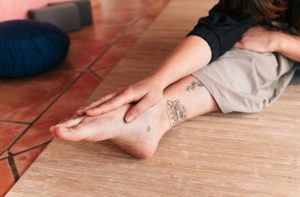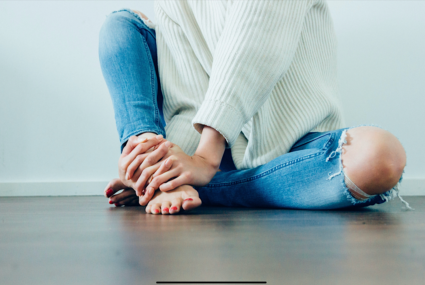The heel may not be one of the most talked about parts of the body, but when it hurts it affects the entire body. Painful heels can be a sign of issues with blocked channels in the body or problems with internal organs. In this article, we are going to discuss how to identify the causes of heel pain and what can be done to correct it.

Heel Pain Symptoms
While heel pain affects people of all ages, the majority of people suffering from pain in the heel are noticed to be middle aged and older persons. Initially, heel pain may begin in one foot as something that is mild and tolerable. However, if the situation is not addressed, the pain can evolve from being relatively mild in nature to severe. In some situations, the pain is associated with puffiness and can start to affect the ankle. Depending on the cause of the ankle pain, some people feel it when they stand after lying down or sitting. Other people may feel pain after standing for a prolonged period of time. Usually, no pain is felt when a person is asleep or resting.
Channels Blocked by Stagnant Blood
This is not an uncommon cause of heel pain. Blood stagnation is the result of old, lower body (hips, legs, or knee) injuries that did not properly heal. The stagnant blood causes a blockage in the channels located near the heel. Over time, if the issue is not corrected, the blood supply to the heel is impacted. The pain will not affect the entire heel, but there will intense pain in the areas that is affected. The body may experience several other types of symptoms as a result of the stagnant blood. Women may experience period pain with severe bleeding with black blood clots. People with these issues may also experience chronic, lower body pain and periodic pain in the knee, legs and lower back.
The only way to correct this type is pain is by doing the following:
- Undergo treatment for the heel while correcting the old injury
- Try to avoid standing barefooted on cold floors
- Engage in exercises that will help to improve circulation to the lower body
- When in pain, soak your feet in warm water for 30 minutes every other day
- Weakened Kidneys
In Traditional Chinese Medicine, the kidney channel flows directly to the heels and covers the majority of the sole of the feet. The kidney channels nourish the structure of the bones. When the kidneys are weak, the heel and sole of the foot do not receive any support from the kidney. The heel does not get any blood supply or nourishment, causing heel pain. The pain subsidies with rest, but increases when a person stands on walks for extended periods of time. Stagnant blood and kidney blockages are not the only cause of heel pain. Other causes of heel pain include wearing uncomfortable shoes, choices in lifestyle, infection and walking or standing for prolonged periods of time.
What Can be Done To Alleviate Heel Pain
If the pain in your heel has not improved in a month, schedule an appointment with your general practitioner. If the exam shows that there are issues with your heel, visit an Ancient Chinese Medicine Practitioner or a clinic such as Acupuncture Perth to have this persistent pain checked. During your visit, the practitioners will check your pulse and tongue. They will also examine you to assess your symptoms to give you an accurate diagnosis. Forms of treatment include Chinese herbal medicine, meridian massage, cupping and acupuncture.



